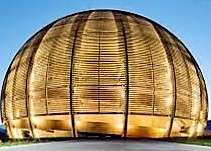Speaker
Description
Stellar explosions such as novae, supernovae, and X-ray bursts involve thermonuclear reactions on rare isotopes. Interpretation of observations such as the light curves from X-ray bursts, elemental abundances, or $\gamma$-rays from nuclear decay as well as predictions of nucleosynthesis are notably impacted by large uncertainties in the nuclear reaction rates. Many of these reactions either have no experimental data available or have only been constrained indirectly.
The SECAR (SEparator for CApture Reactions) recoil separator, recently commissioned at the Facility for Rare Isotope Beams (FRIB), enables direct measurements of the relevant proton- and alpha-capture reaction rates on proton-rich nuclei. SECAR takes advantage of radioactive beams produced by FRIB via projectile fragmentation, which are then stopped, and reaccelerated to low astrophysical energies at the ReA3 facility. Reactions are studied in inverse kinematics by impinging the beam on a hydrogen or helium target in gaseous or solid form. The reaction recoils are counted at SECAR, where a sequence of magnets and velocity filters separate them from the unreacted beam.
I will present the astrophysical motivation for SECAR's development and the results from measurements that have been performed with SECAR during commissioning in 2021.
